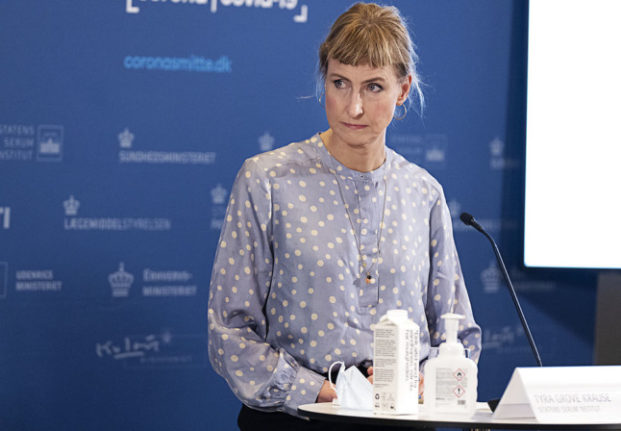Head of department and senior consultant at the State Serum Institute (SSI), Tyra Grove Krause, said the risk of hospital admission was lower with the Omicron variant, now dominant in Denmark, in an interview with Danish broadcaster TV2.
“Omicron will still put strain on our health system but all signs suggest it is milder than the Delta variant,” Krause said.
“The risk of going to hospital is half the size of that with Delta. But we can therefore come under strain in the health system anyway if we see a lot of transmission,” she added.
The senior health official said that the current wave of Covid-19 infections in Denmark, now driven by the dominant Omicron variant, will peak during January. A drop in infections is therefore expected in February.
“Omicron will peak at the end of January, and February will see falling infection numbers and a reduction in strain on the health system. But we must make an effort in January, because it will be hard to get through,” she said in the interview.
Krause told TV2 that people in Denmark could hope to live relatively unaffected by the coronavirus two months from now.
“I think (Covid-19) will have the next two months and after that I hope that infections will begin to pare back and we will get our normal lives back,” she said.
Current Covid-19 restrictions in Denmark include the closure of theatres, cinemas and museums; face mask mandates in stores, public transport and other public places; and coronapas (Covid-19 health pass) requirements at bars, restaurants and cafes among other settings.
Over 20,000 new infections with the virus were registered for four consecutive days up to Saturday, after which lower testing numbers have impacted registrations.
“Omicron is here to stay and it will give massive transmissions in the next month. When that is over, we will be in a better place than we were before,” Krause told TV2.
The number of people in hospital with Covid-19 in Denmark rose on Monday to 770, the highest level since January 2021.
In comments to national broadcaster DR, Krause suggested that a combination of Omicron and vaccines had the potential to give strong protection against Covid-19 globally.
“I think that Omicron will spread globally. I think we will all get some immunity, both through our vaccines and some extra immunity we get through being infected with Omicron,” she said.
“And we will therefore be in a stronger position against possible new variants that might show up,” she added.
Krause also said to TV2 that most of the Danish population can expect to get Covid-19 at some point, but noted that vaccines provide a much better level of protection against serious illness compared to last winter.
That is because vaccination greatly reduces the likelihood of hospitalisation if a person is infected with Covid-19, she said.
However, vaccines are around half as effective against infection with the Omicron variant compared to earlier variants, she also said.
Around 48.5 percent of the Danish population have so far received a booster Covid vaccination. 78 percent have received both doses of the original vaccination.
READ ALSO: Denmark has most Covid-19 hospital patients since January 2021



 Please whitelist us to continue reading.
Please whitelist us to continue reading.
Member comments